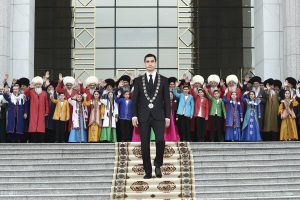There’s a new Berdimuhamedov in charge in Turkmenistan. On March 12, precisely a month after President Gurbanguly Berdimuhamedov called for an early presidential election and declined to run in it himself, Turkmen citizens went to the polls and considered a list of nine names. The president’s 40-year-old son, Serdar, was the only prominent figure on the list and on March 15 Turkmen authorities declared him the victor with 72.97 percent of the vote. Turkmen election officials claimed that 97 percent of registered voters cast their ballots.
There never was a question of whether Serdar would “win.” As Victoria Clement explains in the following interview with The Diplomat’s Managing Editor Catherine Putz, “there is no real political space in Turkmenistan.” Clement, the owner of Central Asian Insights, a consulting firm in northern Virginia, has more than 25 years’ experience developing and presenting educational materials to non-profit, academic, diplomatic, and U.S. Department of Defense communities. Her 2018 book, “Learning to Become Turkmen: Literacy, Language, and Power, 1914-2014,” was the first book in English to be based on research in Turkmenistan’s archives. Clement brings her unique and in-depth knowledge of one of the world’s most opaque states to bear in trying to assess what’s next as Turkmenistan’s carefully choreographed political arena opens a new chapter.
On February 11, Turkmen President Gurbanguly Berdimuhamedov called for an early election to be held on March 12. Turkmenistan wasn’t due for a presidential election until 2024. Why do you think Berdimuhamedov called for the election two years early?
President Berdimuhamedov called for elections on the 15th anniversary of his becoming president of Turkmenistan. There may have been symbolism in choosing that day. But why did he not wait for the next election? No one is certain, but there is speculation that he could be ill. The president is diabetic and had disappeared from public life for several weeks in summer 2019, leading to rumors that he had died or been incapacitated. He may feel physically or mentally weak.
Another catalyst could be the protests-turned-riots seen in Kazakhstan in January, which led to former President Nursultan Nazarbayev’s being stripped of the powers he retained even after stepping down from the presidency on March 19, 2019. Nazarbayev had seen to it that Kassym-Jomart Tokayev assumed the presidency, but Nazarbayev also maintained certain powers such as the chair of the National Security Council. Across Kazakhstan, the public made clear, in part by shouting “Shal ket!” (Old man, get out!) and tearing down statues of Nazarbayev, that they were tired of the way the country was being run.
Berdimuhamedov does not want to wait until he has worn out his welcome. Even though he seems to be trying to implement the first phase of the Nazarbayev model – placing his successor on the throne while preserving some power for himself – Kazakhstani displays of discontent may have spooked him. The de-Nazarbayevification now taking place in Kazakhstan is likely Berdimuhamedov’s greatest fear. He is clearly looking to manage the succession and wants to stay as much in control as he can. By making space, as he said when announcing the early election, for “the younger generation” and allowing Serdar to take up his role now, the president is attempting to reduce the risk to his legacy, his family, and his person.































